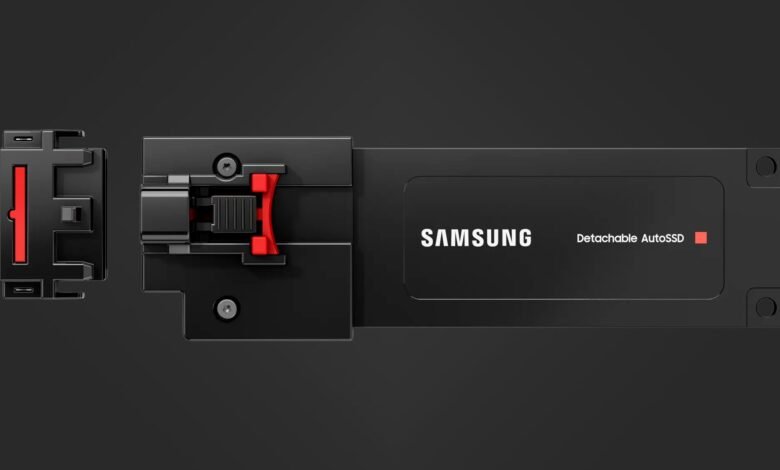Samsung’s Modular SSD Lets You Swap NAND and Controller

▼ Summary
– Samsung previewed its new Detachable AutoSSD (AM9C1 E1.A) and PM9E1 M.2 22×42 SSD at CES 2026, featuring a modular design with swappable NAND and controller.
– The AM9C1 E1.A’s modular configuration allows for future upgrades to faster PCIe 5.0 controllers or higher-capacity NAND, extending its operational lifespan and improving heat dissipation.
– Designed for autonomous vehicles, the AM9C1 E1.A could be adapted for consumer SSDs, though high costs may limit its initial market adoption.
– The PM9E1 M.2 22×42 is a compact PCIe 5.0 SSD with up to 4TB capacity, targeting ultra-thin devices and offering significant performance advantages over competitors like the Corsair MP700 Micro.
– Samsung plans to reveal more details about both SSDs at CES 2026 in Las Vegas from January 6-9, 2026.
With CES 2026 on the horizon, Samsung has unveiled two groundbreaking solid-state drives that promise to reshape expectations for storage technology. The Detachable AutoSSD (AM9C1 E1.A) introduces a modular architecture where the NAND flash and SSD controller exist as separate, swappable units. Alongside this, the company previewed the PM9E1 M.2 22×42, a compact PCIe 5.0 SSD aimed at rivaling the best available options.
Samsung’s original AM9C1 automotive SSD was a BGA drive integrating a 5nm PCIe 4.0 controller and 8th-generation V-NAND. The new E1.A version retains these core components but reimagines the physical layout. Now marketed under the Detachable AutoSSD series, its modular design physically separates the controller and NAND into two distinct modules. This approach simplifies upgrades and replacements while also improving thermal performance to extend the product’s operational life.
Previously, the AM9C1 offered capacities from 128GB to 2TB, with sequential read speeds reaching 4,700 MB/s and writes up to 1,400 MB/s. The modular E1.A form factor introduces remarkable flexibility, enabling automotive manufacturers or end-users to later swap in a faster PCIe 5.0 controller or upgrade storage by installing higher-capacity NAND modules.
Although designed for autonomous vehicle systems, the underlying modular concept could logically transition to the consumer SSD market. Adapting this design for mainstream use is technically feasible, though early adoption would likely come with a significant cost premium, as is common with pioneering technology.
Separately, the PM9E1 M.2 22×42 represents a size-optimized version of the original PM9E1 drive. Where the initial model used the common M.2 2280 form factor, this new variant adopts the more compact M.2 2242 package. This smaller footprint makes it suitable for ultra-thin laptops, tablets, and mini-PCs. While slightly too long for the Steam Deck’s M.2 2230 slot, some enthusiasts have found ways to modify the handheld to accept larger drives, though such alterations are not officially recommended.
The PM9E1 is a PCIe 5.0 drive built around Samsung’s 5nm Presto SSD controller and V8 TLC V-NAND. It functions as the OEM counterpart to the consumer-market Samsung 9100 Pro. Competition in the M.2 2242 category is limited, but the PM9E1 M.2 22×42 will directly challenge Corsair’s recently announced MP700 Micro. Both drives support up to 4TB, a capacity that appeals to Steam Deck users since the larger 2242 form factor can accommodate more NAND packages than the 2230’s 2TB ceiling.
Performance figures for the PM9E1 M.2 22×42 are impressive, with sequential read speeds up to 14.8 GB/s and writes reaching 13.4 GB/s. This gives it a substantial lead over the MP700 Micro, boasting 48% faster sequential reads and 58% faster sequential writes. Although categorized as an OEM product, Samsung’s OEM drives sometimes become available through unofficial channels at lower prices, though buyers typically forfeit the manufacturer’s warranty in such cases.
Samsung is expected to share comprehensive details for both the AM9C1 E1.A and PM9E1 M.2 22×42 at CES 2026, scheduled for January 6–9 in Las Vegas.
(Source: Tom’s Hardware)





